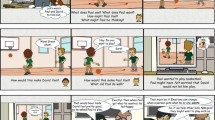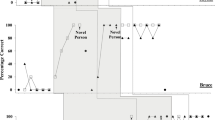Abstract
This study examined the effectiveness of a social skills training program for normal-IQ adolescents with autism. Five boys participated in the 4 1/2-month treatment condition; four boys matched on age, IQ, and severity of autism constituted the no-treatment control group. In addition to teaching specific interactional and conversational skills, the training program provided expliciand systematic instruction in the underlying social-cognitive principles necessary to infer the mental states of others (i.e., theory of mind). Pre- and post-intervention assessment demonstrated meaningful change in the treatment group's performance on several false belief tasks, but no improvement in the control sample. No changes, however, were demonstrated on general parent and teacher ratings of social competence for either group.
Similar content being viewed by others
References
Baer, L., & Ahern, D. K. (1993). Statistical problems with small sample size.American Journal of Psychiatry, 150, 356.
Baron-Cohen, S. (1989). The autistic child's theory of mind: A case of specific developmental delay.Journal of Child Psychology and Psychiatry, 30, 285–297.
Baron-Cohen, S., & Howlin, P. (1993). The theory of mind deficit in autism: Some questions for teaching and diagnosis. In S. Baron-Cohen, H. Tager-Flusberg, & D. J. Cohen (Eds.),Understanding other minds: Perspectives from autism (pp. 466–480). New York: Oxford University Press.
Baron-Cohen, S., Leslie, A. M., & Frith, U. (1985). Does the autistic child have a “theory of mind?≓Cognition, 21, 37–46.
Baron-Cohen, S., Leslie, A. M., & Frith, U. (1986). Mechanical, behavioral and intentional understanding of picture stories in autistic children.British Journal of Developmental Psychology, 4, 113–125.
Berler, E. S., Gross, A. M., & Drabman, R. S. (1982). Social skills training with children: Proceed with caution.Journal of Applied Behavior Analysis, 15, 41–53.
Bowler, D. (1992). Theory of mind in Asperger's Syndrome.Journal of Child Psychology and Psychiatry, 33, 877–893.
Cohen, J. (1992). A power primer.Psychological Bulletin, 112, 155–159.
Goldstein, A. P. (1988).The Prepare Curriculum: Teaching prosocial competencies. Champaign, IL: Research Press.
Gresham, F. M. (1983). Social validity in the assessment of children's social skills: Establishing standards for social competency.Journal of Psychoeducational Assessment, 1, 299–307.
Gresham, F. M., & Elliott, S. N. (1990).Social skills rating system. Circle Pines, MN: American Guidance Service.
Happe, F. G. E. (1994). An advanced test of theory of mind: Understanding of story characters' thoughts and feelings by able autistic, mentally handicapped, and normal children and adults.Journal of Autism and Developmental Disorders, 24, 129–154.
Holroyd, S., & Baron-Cohen, S. (1993). Brief report: How far can people with autism go in developing a theory of mind?Journal of Autism and Developmental Disorders, 23, 379–385.
Hughes, J. N., & Sullivan, K. A. (1988). Outcome assessment in social skills training with children.Journal of School Psychology, 26, 167–183.
Jacobson, N. S., Follette, W. C., & Revenstorf, D. (1984). Psychotherapy outcome research: Methods for reporting variability and evaluating clinical significance.Behavior Therapy, 15, 336–352.
Kazdin, A. E. (1980).Research design in clinical psychology. New York: Harper & Row.
La Greca, A. M. (1993). Social skills training with children: Where do we go from here?Journal of Clinical Child Psychology, 22, 288–298.
Leekam, S., & Perner, J. (1991). Does the autistic child have a theory of representation?Cognition, 40, 203–218.
Leslie, A. M., & Frith, U. (1988). Autistic children's understanding of seeing, knowing and believing.British Journal of Developmental Psychology, 6, 315–324.
Malik, N. M., & Furman, W. (1993). Problems in children's peer relations: What can the clinician do?Journal of Child Psychology and Psychiatry, 34, 1303–1326.
Matson, J. L., & Swiezy, N. (1994). Social skills training with autistic children. In J. L. Matson (Ed.),Autism in children and adults: Etiology, assessment and intervention (pp. 241–260). Pacific Grove, CA: Brooks/Cole.
Mesibov, G. B. (1984). Social skills training with verbal autistic adolescents and adults: A program model.Journal of Autism and Developmental Disorders, 14, 395–404.
Mesibov, G. B. (1992). Treatment issues with high-functioning adolescents and adults with autism. In E. Schopler & G.B. Mesibov (Eds.),High-functioning individuals with autism (pp. 143–155). New York: Plenum Press.
Ozer, D. J. (1985). Correlation and the coefficient of determination.Psychological Bulletin, 97, 307–315.
Ozonoff, S., & McEvoy, R. E. (1994). A longitudinal study of executive function and theory of mind development in autism.Development and Psychopathology, 6, 415–431.
Paquin, M. J. R. (1983). Beyond significant but meaningless results in psychotherapy research.Psychotherapy: Theory, Research and Practice, 20, 38–40.
Parker, J. G., & Asher, S. R. (1987). Peer relations and later personal adjustment: Are lowaccepted children at risk?Psychological Bulletin, 102, 357–389.
Perner, J., Frith, U., Leslie, A. M., & Leekam, S. R. (1989). Exploration of the autistic child's theory of mind: Knowledge, belief, and communication.Child Development, 60, 689–700.
Rosnow, R. L., & Rosenthal, R. (1988). Focused tests of significance and effect size estimation in counseling psychology.Journal of Counseling Psychology, 35, 203–208.
Rutter, M., & Bailey, A. (1993). Thinking and relationships: Mind and brain (some reflections on theory of mind and autism). In S. Baron-Cohen, H. Tager-Flusberg & D. Cohen (Eds.),Understanding other minds: Perspectives from autism (pp. 481–504). New York: Oxford University Press.
Schopler, E., & Mesibov, G. B. (Eds.). (1983).Autism in adolescents and adults. New York: Plenum Press.
Schopler, E., Reichler, R. J., & Renner, B. R. (1988).The Childhood Autism Rating Scale (CARS). Los Angeles: Western Psychological Services.
Walker, H. M., McConnell, S., Holmes, D., Todis, B., Walker, B., & Golden, N. (1983).The Walker Social Skills Curriculum: The Accepts Program. Austin, TX: Pro-Ed.
Williams, T. I. (1989). A social skills group for autistic children.Journal of Autism and Developmental Disorders, 19, 143–155.
Author information
Authors and Affiliations
Additional information
This project was partially supported by a University of Utah Undergraduate Research Opportunities Program grant to the authors. We gratefully acknowledge the assistance of Tom George and Joel Wendel, who served as social skills trainers and assisted in data collection. We also thank the subjects and their families for their long-term support of research on autism. Finally, the helpful comments of two anonymous reviewers on a draft of this manuscript are appreciated.
Rights and permissions
About this article
Cite this article
Ozonoff, S., Miller, J.N. Teaching theory of mind: A new approach to social skills training for individuals with autism. J Autism Dev Disord 25, 415–433 (1995). https://doi.org/10.1007/BF02179376
Issue Date:
DOI: https://doi.org/10.1007/BF02179376




